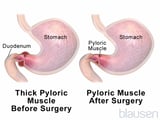Common Etiologies of Pediatric Feeding Disorders
Common feeding problems include gastroesophageal reflux Gastroesophageal Reflux in Children Gastroesophageal reflux is the backward movement of food and acid from the stomach into the esophagus and sometimes into the mouth. Reflux may be caused by the infant's position during feeding... read more , gastroenteritis Overview of Gastroenteritis Gastroenteritis is inflammation of the lining of the stomach and small and large intestines. It is usually caused by infection with a microorganism but can also be caused by ingestion of chemical... read more  , too much food Overfeeding Common feeding problems include gastroesophageal reflux, gastroenteritis, too much food, too little food, and dehydration (fluid loss). Some feeding problems resolve without treatment, but others... read more , too little food Underfeeding Common feeding problems include gastroesophageal reflux, gastroenteritis, too much food, too little food, and dehydration (fluid loss). Some feeding problems resolve without treatment, but others... read more , and dehydration Dehydration in Children Dehydration is loss of water from the body, usually caused by vomiting and/or diarrhea. Dehydration occurs when there is significant loss of body water and, to varying amounts, electrolytes... read more (fluid loss).
, too much food Overfeeding Common feeding problems include gastroesophageal reflux, gastroenteritis, too much food, too little food, and dehydration (fluid loss). Some feeding problems resolve without treatment, but others... read more , too little food Underfeeding Common feeding problems include gastroesophageal reflux, gastroenteritis, too much food, too little food, and dehydration (fluid loss). Some feeding problems resolve without treatment, but others... read more , and dehydration Dehydration in Children Dehydration is loss of water from the body, usually caused by vomiting and/or diarrhea. Dehydration occurs when there is significant loss of body water and, to varying amounts, electrolytes... read more (fluid loss).
-
Some feeding problems resolve without treatment, but others require medical attention or hospitalization.
-
Proper nutrition and feeding techniques can alleviate some feeding problems.
Feeding problems in infants and young children are usually minor but sometimes have serious consequences.
Spitting up (burping up) is the effortless return of swallowed formula or breast milk through the mouth or nose after feeding. This is normal as long as it is not excessive. Almost all infants spit up, because infants cannot sit upright during and after feedings. Also, the valve (sphincter) that separates the esophagus and stomach is immature and does not keep all of the stomach's contents in place. Spitting up gets worse when an infant eats too fast or swallows air. Spitting up usually stops between the ages of 7 months and 12 months.
Spitting up can be reduced by
-
Feeding infants before they get very hungry
-
Burping them every 4 to 5 minutes while feeding
-
Placing them in an upright position during and after feeding
-
Making certain the bottle nipple lets out only a few drops with pressure or when the bottle is upside down
Less commonly, vomiting occurs because of a serious medical disorder. Infants between the ages of 2 weeks and 4 months of age may rarely have forceful (projectile) vomiting after feedings because of a blockage at the stomach outlet (hypertrophic pyloric stenosis Hypertrophic Pyloric Stenosis Hypertrophic pyloric stenosis is blockage of the passage out of the stomach due to thickening (hypertrophy) of the muscle at the junction between the stomach and the intestines. The thickened... read more  ). Vomiting can also be caused by life-threatening disorders, such as meningitis Meningitis in Children Bacterial meningitis is a serious infection of the layers of tissue covering the brain and spinal cord ( meninges). Bacterial meningitis in older infants and children usually results from bacteria... read more (infection around the brain and spinal cord), intestinal blockage Intestinal Obstruction An obstruction of the intestine is a blockage that completely stops or seriously impairs the passage of food, fluid, digestive secretions, and gas through the intestines. The most common causes... read more , metabolic disorders, increased pressure within the skull (due to fluid on the brain Hydrocephalus Hydrocephalus is an accumulation of extra fluid in the normal spaces within the brain (ventricles) and/or between the inner and middle layers of tissues that cover the brain (the subarachnoid... read more
). Vomiting can also be caused by life-threatening disorders, such as meningitis Meningitis in Children Bacterial meningitis is a serious infection of the layers of tissue covering the brain and spinal cord ( meninges). Bacterial meningitis in older infants and children usually results from bacteria... read more (infection around the brain and spinal cord), intestinal blockage Intestinal Obstruction An obstruction of the intestine is a blockage that completely stops or seriously impairs the passage of food, fluid, digestive secretions, and gas through the intestines. The most common causes... read more , metabolic disorders, increased pressure within the skull (due to fluid on the brain Hydrocephalus Hydrocephalus is an accumulation of extra fluid in the normal spaces within the brain (ventricles) and/or between the inner and middle layers of tissues that cover the brain (the subarachnoid... read more  or a mass in the brain Overview of Brain Tumors A brain tumor can be a noncancerous (benign) or cancerous (malignant) growth in the brain. It may originate in the brain or have spread (metastasized) to the brain from another part of the body... read more ), and appendicitis Appendicitis Appendicitis is inflammation and infection of the appendix. Often a blockage inside the appendix causes the appendix to become inflamed and infected. Abdominal pain, nausea, and fever are common... read more .
or a mass in the brain Overview of Brain Tumors A brain tumor can be a noncancerous (benign) or cancerous (malignant) growth in the brain. It may originate in the brain or have spread (metastasized) to the brain from another part of the body... read more ), and appendicitis Appendicitis Appendicitis is inflammation and infection of the appendix. Often a blockage inside the appendix causes the appendix to become inflamed and infected. Abdominal pain, nausea, and fever are common... read more .
A doctor should see any child with vomiting who
-
Has severe abdominal pain
-
Is unable to drink and retain fluids
-
Has a high fever
-
Is lethargic or acting extremely ill or acting very different than usual
-
Vomits for more than 12 hours
-
Vomits blood or green material (bile)
-
Does not urinate in 8 hours
These symptoms may signal dehydration or a more severe condition.
Overfeeding is giving more nutrition than a child needs for healthy growth. Overfeeding occurs when children are automatically fed as a response to crying, when they are given a bottle as a distraction or activity, or when they are allowed to keep a bottle with them at all times. Overfeeding also occurs when parents reward good behavior with food or expect children to finish their food even if they are not hungry. In the short term, overfeeding causes spitting up Spitting up Common feeding problems include gastroesophageal reflux, gastroenteritis, too much food, too little food, and dehydration (fluid loss). Some feeding problems resolve without treatment, but others... read more and diarrhea Diarrhea in Children Diarrhea is a very common problem in children (see also Diarrhea in adults). Diarrhea is frequent, loose, or watery bowel movements (BMs) that differ from a child's normal pattern. Sometimes... read more . In the long term, overfed children can become obese Obesity in Adolescents Obesity is defined as a body mass index (BMI) equal to or greater than the 95th percentile for age and gender. Although genetics and some disorders cause obesity, most adolescent obesity results... read more .
The following is an English-language resource that may be useful. Please note that THE MANUAL is not responsible for the content of this resource.
CLICK HERE FOR THE PROFESSIONAL VERSION

Copyright © 2022 Merck & Co., Inc., Rahway, NJ, USA and its affiliates. All rights reserved.
Source: https://www.msdmanuals.com/en-sg/home/children-s-health-issues/miscellaneous-disorders-in-infants-and-young-children/feeding-problems